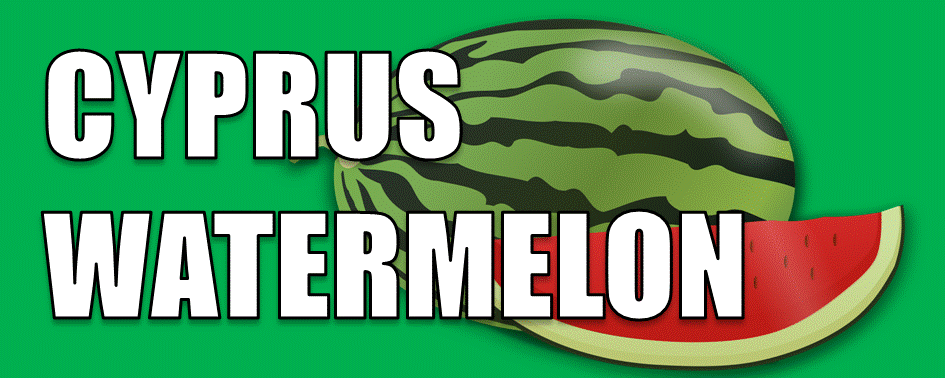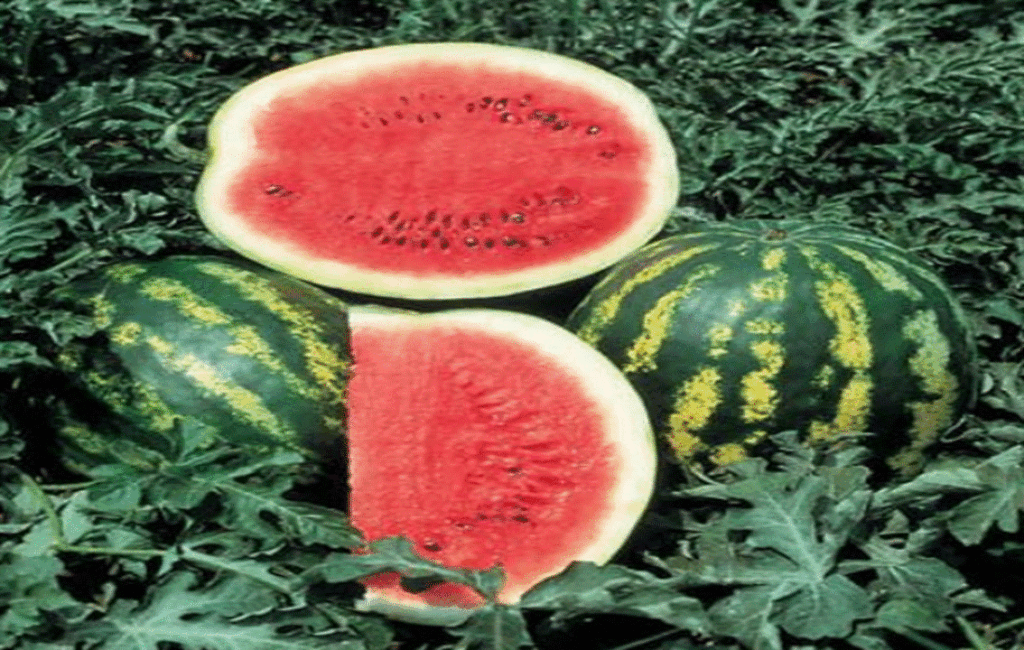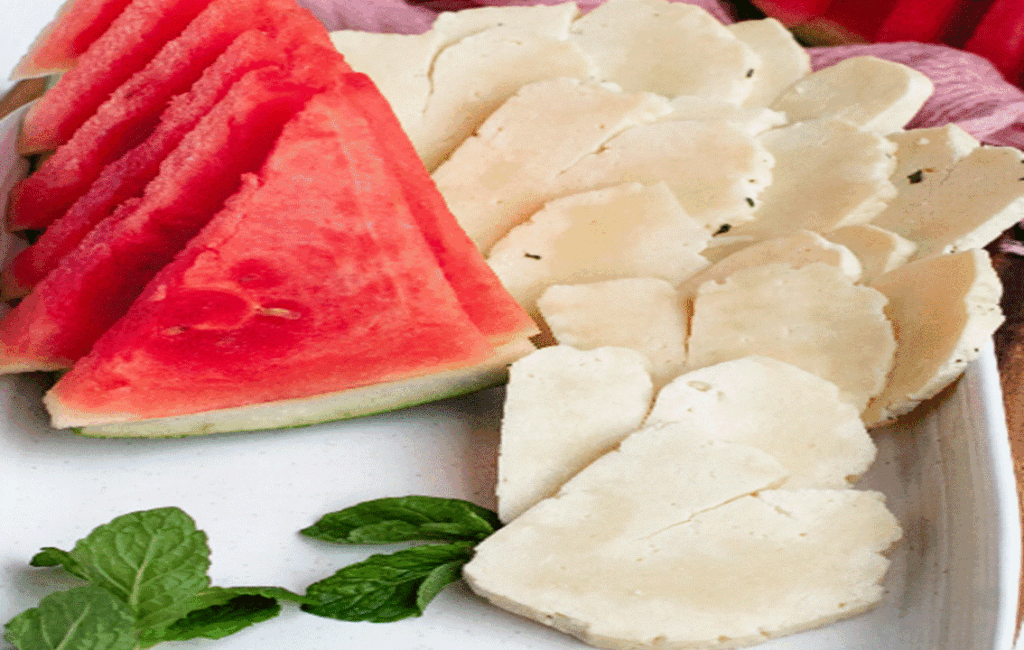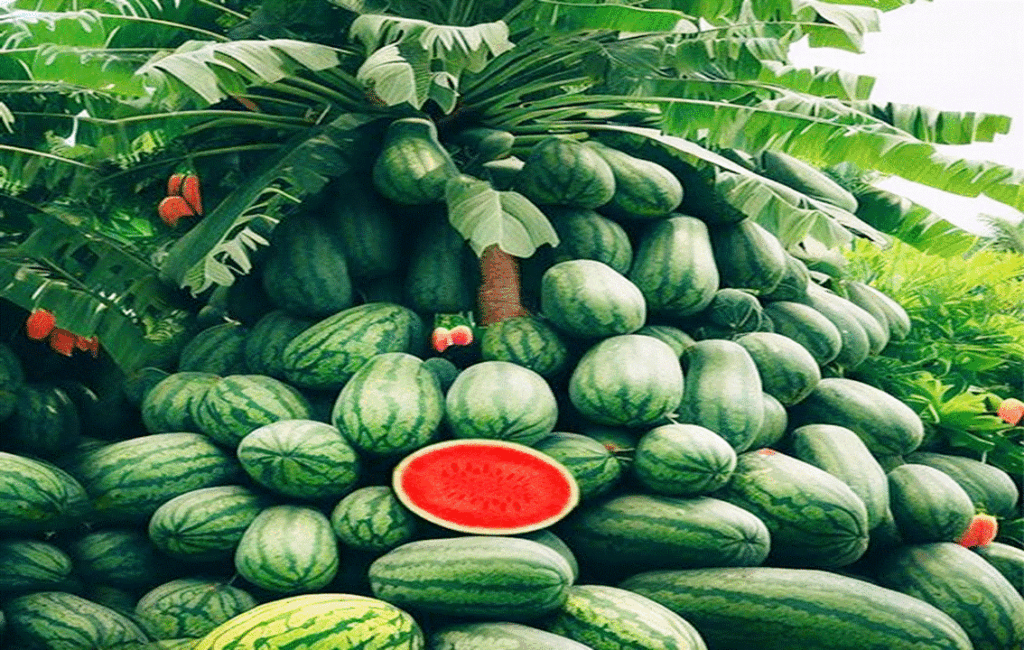
CYPRUS’S VERY OWN SUPER FOOD
CYPRUS WATERMELON
WATERMELON is often a welcome reprieve for many during hot summers in Cyprus. The favourable climate and fertile soil on the island provide the perfect conditions for growing the fruit, making it accessible all over the island. This makes it a fruit of choice for many Cypriots throughout the summer. The vibrant red pinky flesh is usually very sweet and refreshing, and the green and pale yellow outer skin or rind is used to create the sweet preserve, known as GLYKO. Fully-grown Cyprus WATERMELONS are typically round or oval in shape, and the larger ones could weigh up to 10 kilos.
A LIGHT BREAKFAST & REFRESHING SNACK
Many people on the island take WATERMELON for breakfast. They often combine it with halloumi cheese and fresh bread to create a light breakfast. WATERMELON also creates a quick, refreshing snack throughout the day. People often cut and prepare it and then keep it in the fridge, making it readily available throughout the day.
A LOW SUGAR DESSERT IDEAL FOR JUICING
People also take this fruit as a low-sugar dessert after meals. The high water content of the fruit also aids digestion. Ice-cold WATERMELON juice is a great way to quench thirst on a hot day. The juice makes an ideal main ingredient for a granita or smoothie.
A SUPER FOOD
Many experts, as well as several nutritionists, consider WATERMELON to be a super food. The general attitude is that it is beneficial for the human body and helps promote healthy eating through a variety of proven health benefits. It contains 90% water, so it is a good source of hydration. The fruit enables the body to protect itself against free radicals and offers a rich source of several essential nutrients, vitamins, minerals, and antioxidants. Its properties include vitamins A, B6 and C, as well as Magnesium, Potassium and the antioxidants Lycopene and Beta-Carotene. The summer fruit is also rich in fibre, which helps digestion. It also contains many anti-inflammatory compounds that can help reduce inflammation throughout the body. Several experts maintain that it also helps to improve overall cardiovascular health, reducing the risk of chronic heart disease. WATERMELON is cholesterol and fat-free and has a low sugar content, meaning that it is low in calories. This makes it an ideal supplement for most diets or weight loss programs.
A VARIETY OF HEALTH BENEFITS
WATERMELON is a delicious and nutritious fruit that offers a variety of health benefits. It is a great addition to a healthy diet and can help improve overall health and well-being. It is a good source of vitamin A and Beta-Carotene, which both promote healthy eyes. Vitamins B6 and C help boost the body’s immune system. Both vitamins A and C help to promote overall skin health. Its high-fibre content helps to improve digestion, preventing constipation. The fruits Lycopene and potassium content are beneficial for heart health and can also help lower blood pressure. Its Magnesium content benefits healthy muscles, nerves, and bones and also helps to maintain blood sugar levels. Its anti-inflammatory compounds help reduce inflammation in the body.


PICKING A GOOD WATERMELON
Choosing a good sweet WATERMELON can greatly enhance the enjoyment of the fruit. Choosing a good one, however, is difficult at the best of times. Generally, each batch of WATERMELON has been grown together by the same farmer, under the same conditions, so they are of similar quality. However, most Cypriots use several professed, if not amusing, methods to choose a good watermelon, often employing some peculiar techniques. The ridiculous, if not quirky, methodology often makes for entertaining viewing for most onlookers. These techniques for choosing a good WATERMELON include carefully analysing, tapping, and even holding up the fruit to the sun before a selection is made.
SOME HANDY TIPS BEFORE CHOOSING
Here are some of the most popular methods generally used in Cyprus for selecting a good WATERMELON. However, this by no means guarantees to deliver the required results, but may increase your chances of selecting a good watermelon.
- Look for a uniform shape: A good watermelon should be symmetrical and uniform in shape. Odd bumps or irregularities may indicate that it has grown unevenly, which can affect its taste.
- Measure the dark green stripes: Ensure that the dark green stripes on the watermelon’s rind are two fingers wide apart. This shows that is a mature watermelon, enhancing its taste.
-
Check the field spot: The field spot, or the area where the watermelon rested on the ground, should be a creamy yellow colour. A white or green spot may indicate that it was picked too soon and may not be as sweet.
-
Feel for weight: The watermelon should feel heavy for its size. This indicates that it is full of water and likely to be juicier.
-
Tap and listen: Gently tap the watermelon until one of them produces a deep hollow sound. A dull sound may indicate that it’s overripe or not ripe enough.
-
Inspect the skin: Look for firm, smooth skin free from any cuts, dents, or soft spots. The skin should also have a waxy sheen, indicating freshness.
-
Check the tail: If the watermelon has its tail, look for one that is dry and shrivelled. This suggests that it was harvested at the right time.
-
Evaluate the colour: The watermelon’s colour should be vibrant, with dark green stripes. Avoid those with dull or faded colours.
-
Smell the watermelon: Smell the watermelon near the stem area. A sweet aroma indicates ripeness.
-
Choose the right size: Consider what you need. Larger watermelons tend to be juicier, but sometimes a smaller one may be sweeter, depending on the variety and ripeness.


TRY A WATERMELON DIET!
A GREAT WAY TO PURIFY & FLUSH THE BODY
Several people switch to a watermelon-based diet during continuous periods in the summer. It has proven to be a great way to purify and flush the body. A watermelon-based diet can be both refreshing and hydrating, but it is important to approach it thoughtfully. Watermelon is a very versatile fruit. It juices very easily and is often used to create smoothies. The fruit is also used in a variety of salads, and it can also be taken with other complementary low-fat foods. It also pairs well with cheeses, in particular, Cyprus halloumi cheese.
TAILORING A GOOD REGIME
A watermelon diet can be refreshing during summer, but balance is essential for long-term good health. Pairing watermelon with a variety of foods and maintaining proper hydration will lead to a more satisfying and nutritious eating plan. It is also advisable for individuals to tailor a good regime that fits into a specific lifestyle. Several people advocate a one-day-on, one-day-off rule for the diet. Others have been known to extend this rule to two or more days or even a week, but bear in mind that there are no set rules for this.
SOME THINGS TO CONSIDER
1. BALANCE THE DIET
- Do not rely solely on watermelon: This fruit is low in calories and high in water content, but it is also low in essential nutrients. Whilst the watermelon makes up the majority of the diet, it is advisable to include other seasonal fruits, vegetables, lean proteins, and whole grains to create a balanced diet approach. Other fruits such as berries, oranges, bananas, apples or mangos should be added to watermelon smoothies to ensure the body receives a good range of natural vitamins and minerals. Watermelon can also be paired with feta cheese, nuts, mint, or a balsamic glaze to create tasty salads, adding healthy fats and protein to the diet. Watermelon can also be blended into smoothies or sliced and then lightly grilled for a juicy, yet smoky flavour.
2. STAY HYDRATED
- Drink plenty of water: Watermelon is hydrating, but it is still essential to drink water throughout the day, especially in hot weather. Water can also be infused by layering an iced pitcher the watermelon or other fruits or herbs like mint for added flavour.
3. MONITOR PORTION SIZES
- Moderation is key: Eating too much watermelon might lead to gastro-intestinal discomfort due to its high fructose content. Aim for reasonable serving sizes.
4. SMART SNACKING
- Watermelon snacks: Watermelon can be sliced into ready to go portions of wedges or cubes for easy snacking. Frozen Watermelon sticks can also be easily created and stored in a freezer. It can also be a great post-exercise snack due to its hydration properties and ability to replenish electrolytes.
5. MONITOR SUGAR
- Natural sugars: While watermelon contains natural sugars, consuming large quantities could lead to spikes in blood sugar levels. Be conscious if you have any concerns related to blood sugar.
6. PAY ATTENTION TO YOUR BODY
- How do you feel?: If you experience any discomfort or digestive issues, re-evaluate the quantity of watermelon being consumed.
7. CONSULT A PROFESSIONAL
- Ask for guidance: Seek professional advice for any medical conditions or dietary concerns. It may be beneficial to consult a healthcare provider or nutritionist before starting any restrictive diet.


